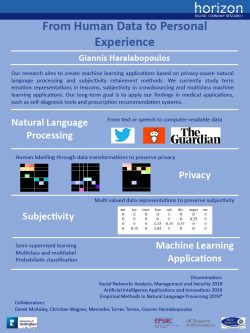Natural Language Processing, Artificial Intelligence and Human centred applications

“During the previous year we paved a research path towards Natural Language Processing, Artificial Intelligence and Human centred applications.” Giannis Haralabopoulos, Research Fellow at Horizon Digital Economy Research explained.

“Initially we studied label acquisition through crowdsourcing and proposed new improved methods for obtaining these labels. Class labels in A.I. applications are important since they act as the guide during the training phase of an algorithm. While crowdsourcing refers to the process by which we obtain non expert input with regards to scientific tasks. Tasks such as identifying objects and matching patterns in pictures, to part of speech tagging and Named Entity Recognition in text, can be performed with the help of the crowd.
However, human traits can negatively affect label acquisition, more so when the task is of subjective nature. Our familiar sentiment analysis requires a subjective labelling task. As the analysis extends beyond the positive or negative classes (commonly referred to as polarity), the classification becomes more and more subjective. Our first couple of publications present our findings on subjective crowdsourcing – how do non-expert individuals label, how they evaluate and what is the importance of demographics in these types of tasks?
Consequently, we introduced subjective quality control methods that assess crowd performance during a purely subjective crowdsourcing task. In collaboration with colleagues from School of Psychology we created a method that improves crowd contributions and promotes subjectivity.
Finally, we implemented our proposed improvements in deep learning tasks for multi label classification problems. A multilabel classification describes a scenario where an object can be classified in multiple classes at the same time.
Future research will slowly step into medicine, building on previous horizon projects and our established interdisciplinary collaborations. The Internet of Things is expanding, and data is more abundant than ever. Our goal is to protect user privacy and create innovative human centred solutions. “















